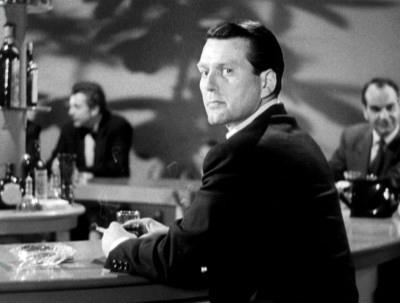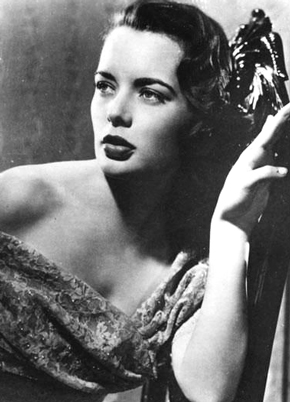
 |
|
|
|
Early in 1950 young RKO producer Stanley Rubin put together the great noir thriller The Narrow Margin, which brought out the full star potential in actors Charles McGraw and Marie Windsor and made such an impression at industry screenings that Rubin soon found himself fielding offers from other studios. The downside was that RKO's Howard Hughes held up the film's release for almost two years, sabotaging McGraw's bid to be established as a Hollywood leading man. A Charles McGraw noir filmed after but released before Margin can't claim classic status but does give the tough guy with the gravel voice a meaty role to play. Roadblock would turn out to be the last starring credit granted the reliable actor. Ace insurance investigator Joe Peters (McGraw) and his partner Harry Miller (Louis Jean Heydt) use a scam to pull a major thief to heel, and ends in the successful recovery of insured money. Returning to Los Angeles, Joe meets and is smitten by the drop-dead beautiful Diane (Joan Dixon). She reminds him repeatedly that she's a high maintenance woman far out of his league: a $350 per month salary just won't cut it. Joe's next case in L.A. has him following racketeer Kendall Webb (Lowell Gilmore). When Diane turns out to be Webb's new girlfriend, Joe can no longer resist temptation: he offers Webb inside information on a massive shipment of money, in exchange for a third of the take. 
The small-scale Roadblock really sees RKO pinching pennies. Many connecting scenes supposedly taking place on city streets were actually filmed on one of the RKO lots -- the fronts of writing bungalows, a lumber mill. By comparison, McGraw's modest thriller Armored Car Robbery seems lavish, with its many location scenes and top-notch noir cast. Roadblock has a fine writing pedigree, with both Geoffrey Homes (Daniel Mainwearing) and Steve Fisher on the credits. This makes it all the more disappointing that its character development and dialogue aren't quite up to snuff. McGraw's Joe is a true-blue law-abiding guy, and the first few reels do a reasonable job of showing him tempted and turned by the promise of a life with the sexy Diane. But then Joe suddenly becomes capable of some pretty ruthless actions, including a brutal murder. Slimy racketeer Kendall Webb is supposed to be rich but answers his own apartment door in this budget picture. He doesn't seem convinced by Joe's newfound criminality, either: it took reform school and prison to make Webb into a lawbreaker, but Joe going bad after so many years of rectitude just doesn't add up. We agree. Overall the movie takes a rock-steady moral position, in which even the villain seems concerned about the importance of the law. Joe Peters is just a "bad apple" noir loser, as opposed to somebody challenging the system for a twisted principle. There's no philosophy or psychological flaw to what he's doing: he just wants the cold cash. If it weren't for the femme fatale character of Diane, Roadblock might just be a straight crime tale instead of a film noir. But the script lets Diane down badly, marooning actress Joan Dixon with an almost unplayable character. Diane is of course a major tease, but isn't really a femme fatale. She never encourages Joe to break the law. Instead, her character does more loop-the-loops than one of Howard Hughes' airplanes. Diane #1 takes advantage of Joe to save a few bucks on a plane ticket. She's attracted to him yet spends the next day belittling his square lifestyle and reminding him that he'll never be able to afford expensive luxuries. She identifies herself as one of these expensive luxuries, a script choice that in feminist terms puts Roadblock in the Stone Age. Diane #2 suddenly decides that she'll settle for Joe Peters' paltry paycheck after all, as she loves him. The only clue to her change of heart is a Christmas scene in which Diane is lonely because Kendall Webb has left town to visit his wife and family. Of course, Diane's timing is lousy, as poor Joe has just committed himself to a major crime and can't back out. Finally, Diane #3 morphs into a happy housewife. She doesn't mind moving to a cheaper apartment and wants nothing more than her man. Sure people change, but the ruthlessly materialistic Diane #1 has disappeared completely, as if she underwent a brain transplant. 
The sexist script implies that the sultry tiger that wouldn't settle for anything less than diamonds and furs has been tamed by matrimonial sex. All Diane needed to straighten her out is a little (insert crude remark here). As Joe says, who gets cold on a honeymoon? And that fire extinguisher that Joe has shipped to himself up in the mountains... why a fire extinguisher instead of something simple like a wedding gift? Are we supposed to think that Joe might spray it on Diane, to cool her off? Joan Dixon is a looker extraordinaire with bedroom eyes; she looks a bit like Gail Russell without the added soulfulness. The script and the direction don't do her any favors. Ms. Dixon gets the worst dialogue lines when she talks about wanting a future that goes like a rocket. The writers also have her using baseball metaphors to describe Joe being out of his league, income-wise. I afraid Dixon gets chalked up as another Howard Hughes-RKO find who had potential but didn't stick around too long. Roadblock was her biggest picture; perhaps acting wasn't her main interest. At least Joan didn't end up shoehorned into a skimpy harem costume for the flesh parade Son of Sinbad, with a dozen or so other ex-starlets on Hughes' payroll. Roadblock can't hide its cheapness. The plot centers around a major train robbery, which happens off-screen and is instead represented by a Lionel train setup Joe Peters toys with in a country store up in the mountains. I wouldn't be surprised to find out that the outdoorsy stuff hunting and fishing, as well as the frequent talk about airplanes, was inserted into the script to keep RKO chief Hughes happy. Stock shots abound. A car crash high up on Mulholland Drive is represented by a miniature effects stock shot from the original 1940 High Sierra -- that takes place on a flat parcel of desert. It doesn't cut well -- Charles McGraw gives the car a slight push, and across a cut it's suddenly going 40 mph. |
|||||||||||||||||||
Review Staff | About DVD Talk | Newsletter Subscribe | Join DVD Talk Forum
Copyright © MH Sub I, LLC dba Internet Brands. | Privacy Policy
Subscribe to DVDTalk's Newsletters
|